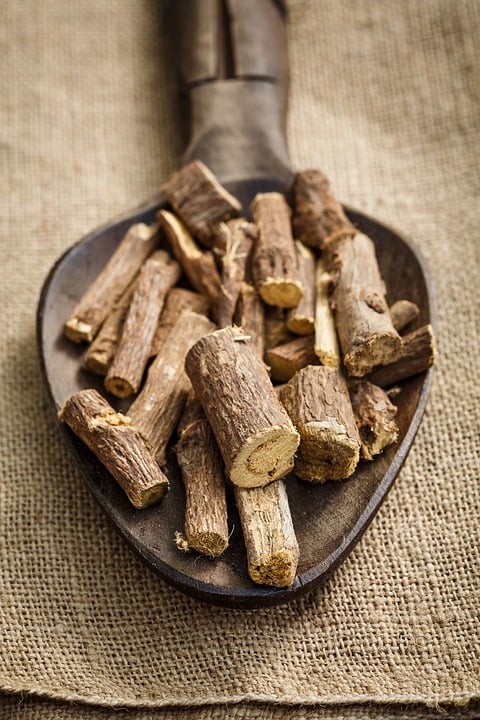
The use of the liquorice plant was first learnt by the Greeks from the Scythians and it was prescribed by the father of medicine Hippocrates (460 B.C.), in cases of dropsy and to relieve thirst. As a medicine, liquorice was well known in Germany in the eleventh century and was extensively cultivated in Bavaria, in the sixteenth century. Native to South-east Europe and South-west Asia, hundreds of tons of liquorice are imported annually for commercial and medicinal purposes.
Historically, writers called it “Sweet wood” and “Lycoryth” but its botanical name is Glycyrrhiza glabra. This refers to its chief constituent glycyrrhizin to which its sweet taste is due – about 50 times sweeter than sugar, yet it is diabetic-safe! In the body, glycyrrhizin yields glycyrheticic acid, which is similar to the hormones of the adrenal cortex, making it beneficial for adrenal gland problems such as Addison’s disease.
Liquorice root is a most valuable medicine for the digestive system. It acts as a gentle laxative and lowers stomach-acid levels, therefore relieving heartburn. Used to heal stomach ulcers, it spreads a protective gel over the stomach wall and, in addition, it will ease spasms in the intestines.
It is a widely-used remedy for coughs and lung complaints with soothing, expectorant and anti-spasmodic properties. Take it in cases of bronchial problems, coughs, hoarseness, mucous congestion and chest complaints, and also to help reduce fevers.
Liquorice can neutralise many toxins and there appears to be evidence that it has antibacterial properties. It helps stimulate the flow of bile, lowers blood cholesterol levels and provides relief in allergies. However, people with high blood pressure should NOT use it, as it may aggravate their condition.
The plant belongs to the legume family which include peas and beans, but it is the root that is used in herbal medicine, which is unearthed in autumn, cleansed and thoroughly dried. To make an infusion, use one heaped teaspoonful of the crushed liquorice root with one cup of boiling water, steep for a few minutes and strain.
Find out more about the medicinal benefits of liquorice and other plants through enrolling in our Online Herbal Medicine Course today!
